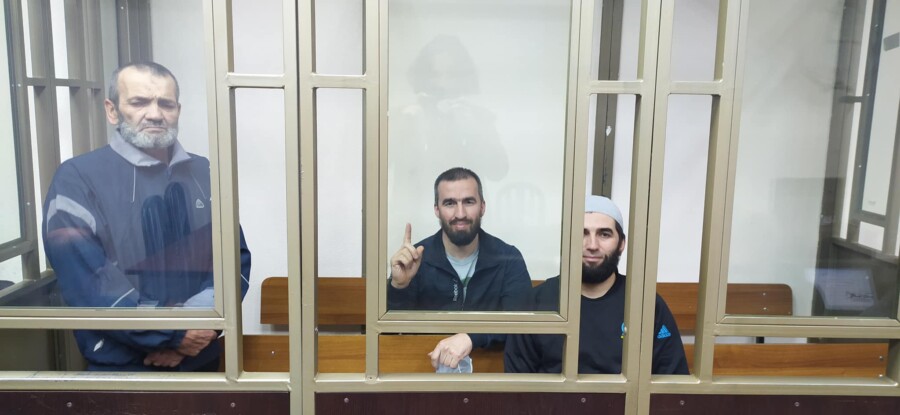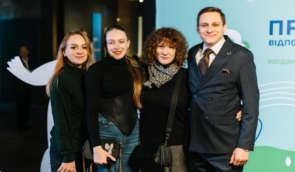Statement on prosecution of Crimean Muslims ‘Bilohirsk Group’
On 11 January 2021, the Southern Military District Court of Rostov-on-Don will hold a final hearing in the trial of Crimean Tatars, Muslims who are citizens of Ukraine. Enver Omerov, Riza Omerov and Ayder Dzhapparov will speak their last word, and in the coming days they will be sentenced. The three men are charged with “conducting terrorist activities” and participating in the activities of the Hizb ut-Tahrir organisation.

On 23 December 2020, during a court hearing in Rostov-on-Don, the state prosecution asked to award the Bilohirsk group defendants of the Crimean Muslims case long terms of imprisonment: 59-year-old Enver Omerov – 19 years in a high-security prison, his son Riza Omerov – 13 years in a high-security prison, Ayder Dzhapparov – 18 years in a high-security prison.
All three men, residents of Bilohirsk district of Crimea, were detained on 10 June 2019. Riza Omerov and Ayder Dzhapparov were detained after raids on their homes, and Enver Omerov – on the way to a court hearing in Rostov-on-Don (he is a father-in-law of Rustem Ismayilov, a defendant in the first Simferopol group of the ‘Crimean Muslims case’). Riza Omerov’s wife was taken to a hospital with premature delivery as her waters had broken during the raid. Also on that day, Russian security forces detained five more Crimean Muslims in Alushta and Simferopol districts of Crimea.
Enver Omerov, Riza Omerov and Ayder Dzhapparov supported the Crimean Tatars, who were persecuted by the Russian authorities, and their families. For example, Enver Omerov organised mass festivities for children in Bilohirsk. He provided assistance to compatriots who had previously been affected by reprisals on part of the authorities and law enforcement agencies. He also volunteered, in particular, helping the families of political prisoners and sending parcels with food to prisons for political prisoners.
On 3 June 2020, the Southern Military District Court of Rostov-on-Don began hearing the Bilohirsk group case on the merits. According to the case files, the defendants did not have weapons, explosives, ammunition, did not plan to commit a terrorist act and did not call on others to commit terrorist acts. The case files contain only audio recordings proving that the defendants discussed religious and political topics. In fact, this was the only evidence of commission a “crime.”
It is well known that the Russian Federation has used its anti-terrorist and anti-extremist legislation to suppress dissent in the occupied Crimea not for the first time. Representatives of the Crimean Tatar people, as well as Ukrainians, are the most common victims of persecution. Journalists, lawyers, human rights defenders, civil society activists and other members of civil society are also among the most vulnerable.
According to Ukrainian human rights organisations, the number of political prisoners – Ukrainian citizens jailed in Russia and the occupied Crimea – exceeds 100 people. More than 70 of them are Crimean Tatar Muslims who are being prosecuted on apparently fabricated charges of terrorism and extremism. About 200 children have been deprived of parental care.
We strongly condemn the ongoing persecution of Muslims and Crimean Tatar activists in the temporarily occupied Crimea on trumped-up charges and demand that the government of the Russian Federation must:
- immediately release all political prisoners, including illegally detained and convicted members of the Bilohirsk group in a politically motivated criminal case against Crimean Muslims;
- stop other forms of persecution of Crimean Tatars and Crimean Muslims, including administrative arrests, criminal charges, confiscation of property and other forms of reprisals;
- immediately stop the use of the so-called anti-terrorist legislation of the Russian Federation for politically motivated persecution in the temporarily occupied territory of Crimea.
We call on international organisations and governments of democracies to:
- condemn the actions of the Russian Federation aimed at the political persecution of lawyers, human rights defenders and civil society activists in the occupied Crimea;
- continue to put pressure on the Russian government to secure the release of all political prisoners, stop the persecution of Crimean Tatar people, including the Crimean Solidarity activists and pro-Ukrainian activists;
- strengthen sectoral sanctions against Russia for systematic gross human rights violations, war crimes and crimes against humanity committed in the occupied Crimea;
- facilitate the monitoring of trials of Ukrainian citizens in Russian courts and Crimean “courts” controlled by the occupying power, and send observers to trials in Russian courts;
- facilitate the work of independent monitoring missions under the auspices of the United Nations, the OSCE and the Council of Europe with a mandate to monitor the human rights situation in Crimea, including freedom of religion and peaceful assembly. The monitoring mission should work with the permission of the Ukrainian authorities and consultations with Ukrainian and international non-governmental organisations.
We address the President of Ukraine, the Verkhovna Rada of Ukraine, the Ministry of Reintegration of the Temporarily Occupied Territories of Ukraine, the Prosecutor’s Office of the Autonomous Republic of Crimea and city of Sevastopol with a request to:
- ensure efficient investigation into the illegal imprisonment and prosecution of Enver Omerov, Riza Omerov and Ayder Dzhapparov, as well as all other gross violations of religious freedom and peaceful assembly in the temporarily occupied Crimea, in order to ensure the principle of irreversibility of war crimes and other human rights violations;
- elaborate and approve the necessary comprehensive legislation to ensure the protection and state support for persons who are illegally deprived of their liberty and are subjected to politically motivated persecution by the occupying authorities of Crimea and the Russian Federation;
- adopt a draft law on amendments to some legislative acts of Ukraine to ensure the harmonisation of domestic criminal legislation with the provisions of international law (No. 2689) and introduce liability for crimes against humanity and war crimes committed in the occupied Ukrainian territories;
- ensure the independent work of the Department of Supervision of Criminal Proceedings over Crimes Committed Amid Armed Conflict within the Office of the Prosecutor General and create conditions for enhancing its activities.
ZMINA Human Rights Centre
Association of Relatives of the Kremlin Political Prisoners
Center for Civil Liberties
Crimea-SOS
Crimean Human Rights Group
Media Initiative for Human Rights
Ukrainian Helsinki Human Rights Union
Regional Centre for Human Rights
Kharkiv Human Rights Protection Group
Educational Human Rights House Chernihiv
Diya Human Rights Center
If you have found a spelling error, please, notify us by selecting that text and pressing Ctrl+Enter.















